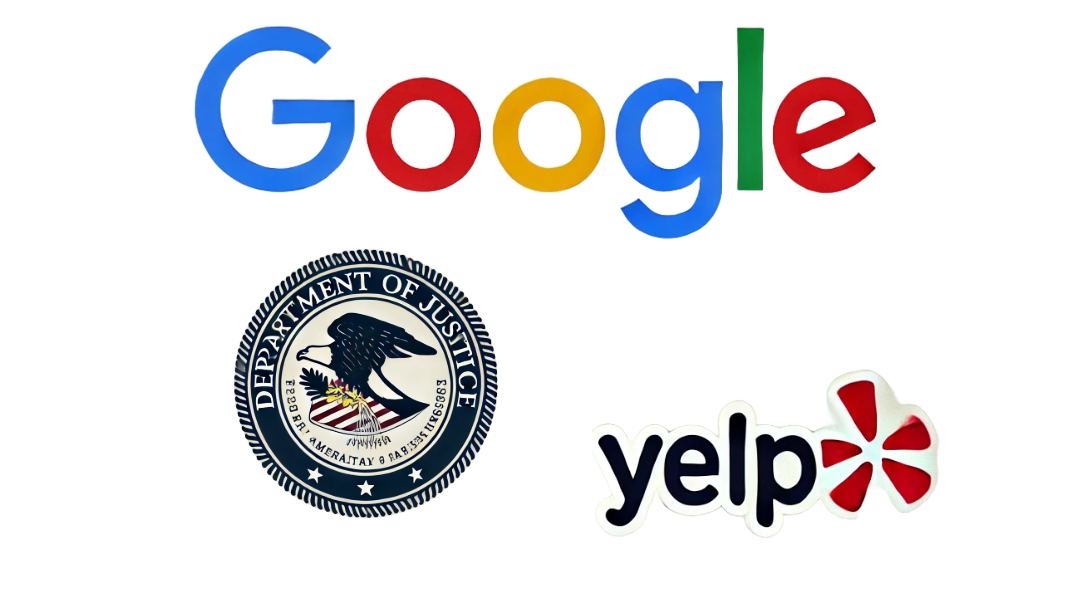The Google vs. Yelp Antitrust Battle: Implications for Business Websites, Keyword Searches, and Domain Valuation
The ongoing antitrust lawsuit between Google and Yelp has reignited discussions around the power dynamics in the tech industry, particularly regarding search engine monopolies and their impact on competition. Yelp’s lawsuit, filed in August 2024, accuses Google of abusing its dominant position in the general search market to prioritize its own services, particularly in local search and advertising, at the expense of competitors. This case could have far-reaching consequences not only for major tech companies but also for small and medium-sized business websites.
Historical Context: Similar Antitrust Cases
The lawsuit between Google and Yelp is reminiscent of several key historical antitrust cases in the tech industry. A notable comparison is the United States v. Microsoft Corp. (2001), where Microsoft was accused of maintaining a monopoly in the PC market by bundling its Internet Explorer browser with the Windows operating system, thus stifling competition from other browsers like Netscape. The case resulted in Microsoft agreeing to share its application programming interfaces with third-party companies, leading to greater competition and innovation in the software market.
Another pertinent case is the European Union vs. Google (2017), where Google was fined €2.42 billion for favoring its own comparison shopping service over competitors in search results. The European Commission argued that Google’s practices harmed consumers by depriving them of genuine choice and innovation. These cases illustrate how antitrust actions can curb monopolistic practices and open up markets to healthier competition.
Potential Benefits for Business Websites
If Yelp’s lawsuit against Google succeeds, it could pave the way for a more level playing field in search engine rankings, particularly for local businesses. Here’s how the case might benefit business websites:
1. Increased Visibility for Competitors: A ruling against Google could force the search giant to change its algorithms to treat competitors’ content more equitably. This could increase visibility for smaller businesses that rely on organic search traffic, as they would no longer be unfairly overshadowed by Google’s own services.
2. Enhanced Keyword Search Fairness: With Google potentially being restricted from self-preferencing, keyword searches could yield more diverse and relevant results. This would enable businesses to better compete for attention based on the quality of their content rather than being disadvantaged by Google’s manipulation of search rankings.
3. Boosted Domain Name Rankings and Valuation: A more competitive search environment could lead to higher rankings for domains that provide valuable, relevant content, regardless of whether they are affiliated with Google. This could, in turn, increase the valuation of premium domain names, as businesses recognize the importance of owning a domain that can stand out in an unbiased search landscape.
Impact on Keyword Searches, Domain Name Rankings, and Valuation
The outcome of this lawsuit could have a significant impact on keyword searches and how domain names are valued:
- Keyword Search Dynamics: Currently, Google’s algorithm heavily influences which keywords bring traffic to a site. If Yelp’s lawsuit leads to changes in Google’s search practices, businesses might find that the keywords they optimize for are more likely to perform well, provided they offer quality content that genuinely meets users’ search intent.
- Domain Name Rankings: As search results become less biased, domains that might have been pushed down in rankings due to Google’s self-preferencing could see a rise in their positions. This would particularly benefit businesses that invest in SEO and content marketing, as their efforts would be more likely to translate into higher search rankings.
- Domain Valuation: The value of domain names could increase as a result of a more competitive search environment. Premium domains, which are often valued based on their potential to rank well in search engines, could see a surge in demand as businesses look to capitalize on fairer search results.
The antitrust case between Google and Yelp represents more than just a legal battle between two tech companies; it could reshape the digital landscape in ways that benefit businesses of all sizes. By challenging Google’s search practices, Yelp is pushing for a more competitive environment that could enhance visibility for business websites, lead to fairer keyword search results, and increase the value of premium domain names. As the case unfolds, it will be crucial for businesses to stay informed and adapt their digital strategies to take advantage of any changes that might arise from this landmark legal challenge.

